DNA, Ancestry, & Reparations

By: Christian Parks, Ella Berry, Kelechi Udeze, Shanzey Syed
Are genetic ancestry tests a valid means of determining who received reparations for slavery?
Four hundred years have passed since the beginning of slavery in the United States, a violent practice that stripped enslaved Africans of their identities from the Motherland. Even after the end of legal slavery in 1865, racism was rampant as it was engrained into discriminatory laws that created the structural barriers that are currently hindering Black Americans today. For instance, discriminatory housing policies, like redlining, impede African Americans’ ability to own property and accrue generational wealth leading to segregated communities today. Despite this, many people still believe that these problems are a thing of the past, but scholars argue the need for reparations to mediate these systematic disparities. Many of these reparations include financial assistance such as free college tuition, business grants, and direct payments. In addition to these, providing healing, reconciliation, and affirmation of African ancestry for descendants of African American slaves may help to remedy such problems.
So how do we determine who receives such reparations? Some of the methods for determining this include using the census records, genealogical backgrounds, and genetic ancestry tests. Advancement in DNA technology via direct-to-consumer (DTC) genetic testing has opened the door for descendants of enslaved Black Americans to claim their ancestors who have been severely wronged by hundreds of years of exploitation and abuse. The goal of this magazine is to explore the connections between genetic testing and slavery reparations in the hopes of challenging misconceptions about reparations and exploring the potential of DNA technology to repair ongoing disparities in United States.
comments powered by Disqus